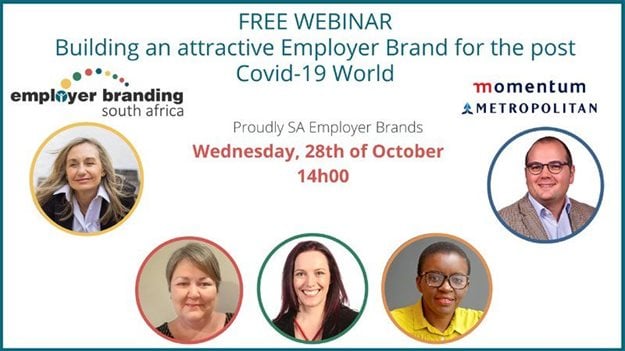#EvolutionofWork: Building an attractive employer brand for the post-Covid-19 world

Background
Celeste Sirin, Employer Branding SA, kick-started the webinar by sharing some interesting research from a Gartner Survey, which revealed that 82% of company leaders plan to allow employees to work remotely some of the time. As companies migrate their employees back into the workplace, serious consideration is being given to creating the popular hybrid workplace model with employees working both onsite and remotely. However, this does not come without challenges; such as workers struggling to establish boundaries between private and work life, not being able to disconnect, resulting in high levels of burnout, questionable levels of trust related to productivity between both employees and leaders, upskilling remote workers to deliver more competently etc.
The shift of traditional EVP practices to one of holistic well-being
Dr Benade, practice lead for Employee Insights and Well-being and custodian of Momentum Metropolitan’s EVP at a Group level, said their biggest realisation was that they couldn’t try to be everything to everyone. Upon establishing this, they set out to understand what they wanted to achieve in order to target and attract their key talent segments.
Nowadays, talent is looking for what is valuable for them in terms of growth plans, ability to work from everywhere and anywhere and flexibility has become an important employment consideration.
The traditional EVP offerings/services of e.g. a nice canteen, coffee shops or watercooler set-ups have become less relevant. Being properly set up from home with the right technology, data availability and fibre-line connectivity is now what counts.
The well-being of employees has always been important for Momentum Metropolitan, but Benade confirms that wider consideration for individual financial wellness support and mental well-being is becoming increasingly important.
Leadership challenges with managing virtual teams
Chief learning officer to Momentum Metropolitan, Chantel van der Westhuizen highlighted the challenges leaders were facing with managing virtual teams and how they were enabling their leaders to weather the Covid storm. As with many organisations, Chantel confirmed that there is “no textbook recipe” and the challenge was around how to respond appropriately when the answers weren’t necessarily there.

Van der Westhuizen confirmed that Momentum Metropolitan has always been a strong relationship-based organisation with a solid culture, and leaders have been struggling with not being able to engage employees face-to-face, resulting in leaders:
- questioning and/or feeling like they are not contributing sufficiently enough to the lives of their employees as they work remotely;
- facing the dichotomy of whether they and their teams are being productive enough versus running the risk of burnout. In the initial stages of lockdown, people worked so hard, but this has tapered off, with leaders now wondering whether their people are being productive;
- remaining connected to their people digitally, whilst it is difficult to replicate purpose and meaning if not physically connected and sitting together in person.
Van der Westhuizen believes that competencies are no different to the past, but it is now all about how we demonstrate and act on them i.e. the ability to function in a digital environment is not new but it’s about how to “learn in the flow of life”.
Cognitive and problem solving abilities to manage large projects are just some of the competencies, but key is the energy, focus, meaning, purpose and hope that leaders can bring into the workplace, all of which is connected to the greater good of the organisation.
The shift to virtual and alternate talent landscape
Lyn Muzondo, Head of Human Capital for Metropolitan Retail confirmed that Metropolitan’s business consists of just over two-thirds of salesforce, where business is conducted face-to-face.
Fortunately, pre-lockdown, Momentum Metropolitan’s digital processes for sales advisors were already in place, but she admits that adjusting to virtual versus face-to-face was challenging.
However, they did not stop recruiting for advisors and Muzondo believes our local talent market boasts “real gems”.
Formulated a gig workforce strategy for their non-sales talent requirements
Muzondo explained that Momentum Metropolitan chose not to expand their workforce unnecessarily until they had a better understanding of how Covid-19 would affect their staffing requirements. They reverted to contracting, freelancing and crowdsourcing, which was particularly effective in their creative, writing/designing and digital roles amongst the young millennials.
Growing the talent from within
It was comforting to hear Muzondo reaffirm the company’s support to nurture the skills development of homegrown talent over growing their international gig workforce. They advertise internally first, with a view to looking after their “talent bench”. When non-critical positions fall away, their focus is on actively reskilling, upskilling and growing their own talent into these roles first.
Digital in sales frontline roles
Muzondo says that “Work is an activity and not a place,” thus being more flexible in where they source their talent from. They are looking towards transforming and enhancing their recruitment, onboarding, training, and e-learning to a digital and more mobile-friendly environment, to improve better engagement, upskilling and to remain digitally relevant in the workplace.
Keeping remote employees connected to your organisational culture and brand
Dieter Veldsman, group human capital executive of Momentum Metropolitan Holdings (MMH), summarised the discussion with five key pointers to achieving an attractive organisational culture:
- Be clear on what your organisation stands for culturally and what your purpose is, otherwise it will be a challenge to connect your people to what you stand for as a brand (irrespective of working remotely or in-person).
- Once clear on the above, it needs to be translated into the workplace i.e. integrated into the employee experience to create meaningful and memorable moments that employees can relate to.
- The mindset shift of the new normal is not temporary and there are certain things that have to be implemented for the sustainable longer term. Social connection and collaboration will now look different and consideration to how best to utilise office places differently as it relates to collaborating and checking in. Leveraging off the virtual environment will be increasingly necessary to keep connected, through implementing rituals that engage employees and still allows for some fun whilst being virtual.
- Leadership competencies and skills are not different from the past, but it is about changing the mindset and working towards getting them aligned to the new remote digital environment. In this way bringing hope and meaning to employees through consistent connectivity.
- Implement a “heartset approach” within your organisation where, with every story or narrative and/or every single interaction, there is something that inspires them to believe in their future. With people being tired and somewhat pessimistic of late, think of how you can create the inspiration where people can hope and dream about the future. Employees want to work for an organisation that thinks human first and then translates this thinking into every practice, policy, engagement and interaction.




